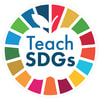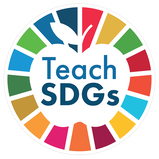|
By Jenny Kaste, TeachSDGs Ambassador
Recently I was at a board meeting of a local nonprofit with which I am involved. We were discussing an upcoming networking event, which all board members were expected to attend to rub elbows and make connections. Without thinking, I rolled my eyes and sighed, “I just don’t enjoy talking to adults.” A bit surprised by my own outburst, I tried to laugh it off like a joke, but this offhanded remark has stuck with me. Every single day that I’m at school, a person says something that inspires me, makes me laugh, ignites my creativity, or touches my heart. Even on bad days, when lessons flop and technology fails, I find joy in the minds and hearts of the people I choose to surround myself with. The fact that these people are under 16 years old doesn’t matter. Well, actually I think it does. When I talk to adults I don’t hear new ideas, creative ways to look at the world or an optimistic hope for the future. I don’t hear a desire, or even a willingness, to learn and take in new ideas. I was right at that board meeting. I don’t prefer talking to adults. I have recently started using the United Nations 17 Sustainable Development Goals as a part of my instruction. As I introduced this checklist to make a better world to a new group of change makers, I was struck by the contrast between how they received the ideas and the way adults I talk to about them respond. The 5th grade people immediately took responsibility for these Goals. They immediately asked the big questions and were filled with a million ideas for action. No one said “that’s not possible.” There was no talk of politics, no me-first ideas. The learners in my room didn't talk about laws or costs. They used words like fair and right. The Goals didn’t divide my classroom they united it. #StudentVoice is trending and youth activists are on the cover of magazines. It’s easier today than ever to give the young people I work with an authentic audience for their ideas and passion. Technology paves the ground for them to solve problems and lead revolutions. It’s an exciting time to be an educator. I don’t see myself as a gate keeper of their voices. I think of it as an honor and a privilege to be a part of their conversation. I hope I can influence them, help them edit their message and hone their communication skills. I want my instruction to give them what they need to create their solutions. I model how to connect globally. I encourage them to create opportunities for themselves. I teach because I believe this world can be a more equitable, sustainable, and tolerant place. And if I believe the world is going to be a better place, then I should spend my time talking to people who are actually going to change it. Comments are closed.
|
AuthorSTeachSDGs Team & Contributors Archives
November 2019
Categories |


 RSS Feed
RSS Feed